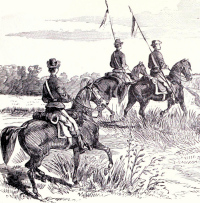Camp Haskell, October 24th. We have marched twelve miles to-day, and are encamped near the house of a friendly German farmer. Our cortege has been greatly diminished in number. Some of the staff have returned to St. Louis; to others have been assigned duties which remove them from headquarters; and General Asboth’s division being now in the rear, that soldierly-looking officer no longer rides beside the General, and the gentlemen of his staff no longer swell our ranks.
As we approach the enemy there is a marked change in the General’s demeanor. Usually reserved, and even retiring, –now that his plans begin to work out results, that the Osage is behind us, that the difficulties of deficient transportation have been conquered, there is an unwonted eagerness in his face, his voice is louder, and there is more self-assertion in his attitude. He has hitherto proceeded on a walk, but now he presses on at a trot. His horsemanship is perfect. Asboth is a daring rider, loving to drive his animal at the top of his speed. Zagonyi rides with surpassing grace, and selects fiery chargers which no one else cares to mount. Colonel E. has an easy, business-like gait. But in lightness and security in the saddle the General excels them all. He never worries his beast, is sure to get from him all the work of which he is capable, is himself quite incapable of being fatigued in this way.
Just after sundown the camp was startled by heavy infantry firing. Going around the spur of the forest which screens head-quarters from the prairie, we found the Guard dismounted, drawn up in line, firing their carbines and revolvers. The circumstance excites curiosity, and we learn that Zagonyi has been ordered to make a descent upon Springfield, and capture or disperse the Rebel garrison, three or four hundred strong, which is said to be there. Major White has already gone forward with his squadron of “Prairie Scouts” to make a reconnaissance in the direction of Springfield. Zagonyi will overtake White, assume command of the whole force, which will number about three hundred men, and turn the reconnaissance into an attack. The Guard set out at eight o’clock this evening. A few are left behind to do duty around headquarters. Lieutenant Kennedy, of the Kentucky company, was ordered to remain in command of our Home-Guard. He was greatly grieved, and went to the Major and with tears in his eyes besought him to permit him to go. Zagonyi could not refuse the gallant fellow, and all the officers of the Guard have gone. There is a feeling of sadness in camp to-night. We wonder which of our gay and generous comrades will come back to us again.
Fremont’s Hundred Days in Missouri was published in three installments in The Atlantic Monthly. The anonymous author appears to have been a member of Fremont’s staff with a disdainful bias towards Missourians, even those who were pro-Union.
